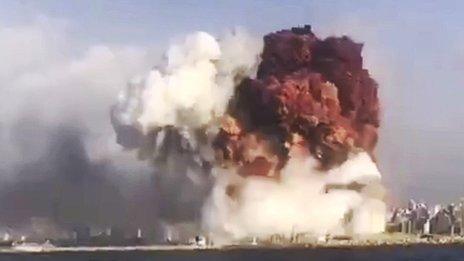Beirut explosion: Macron calls for 'deep change' in Lebanon after blast
- Published
'We are doing what we can': How Beirut is trying to pull together to help in the clean up after the blast
France's President Emmanuel Macron has called for "profound change" from Lebanon's leadership following Tuesday's huge explosion in Beirut.
Visiting the devastated city, he called for an international investigation.
Many Lebanese say government corruption, neglect and mismanagement led to the explosion.
It killed at least 137 people and injured about 5,000 others, while dozens are still missing. A two-week state of emergency has begun.
Lebanese President Michel Aoun says it was caused by 2,750 tonnes of ammonium nitrate stored unsafely in a warehouse.
The state news agency says 16 people have been taken into custody as part of the investigation.
Judge Fadi Akiki, a government representative at the military court, said more than 18 port and customs officials and maintenance workers at the warehouse had been questioned.
What did Macron say?
The first world leader to visit since the explosion, Mr Macron described it as a "metaphor for Lebanon's current crisis" and said a "new political order" was needed. Funding was available for the country but its leaders had to implement reforms first, he said.
He also called for an international investigation into the explosion "to prevent things from remaining hidden and doubt from creeping in".
An aid conference for Lebanon would be announced in the coming days, he said. France would make sure aid was sent directly to relief organisations working on the ground.
An audit of Lebanon's central bank was also needed - "If there is no audit of the central bank, in a few months there will be no more imports and then there will be a lack of fuel and of food," Mr Macron said.
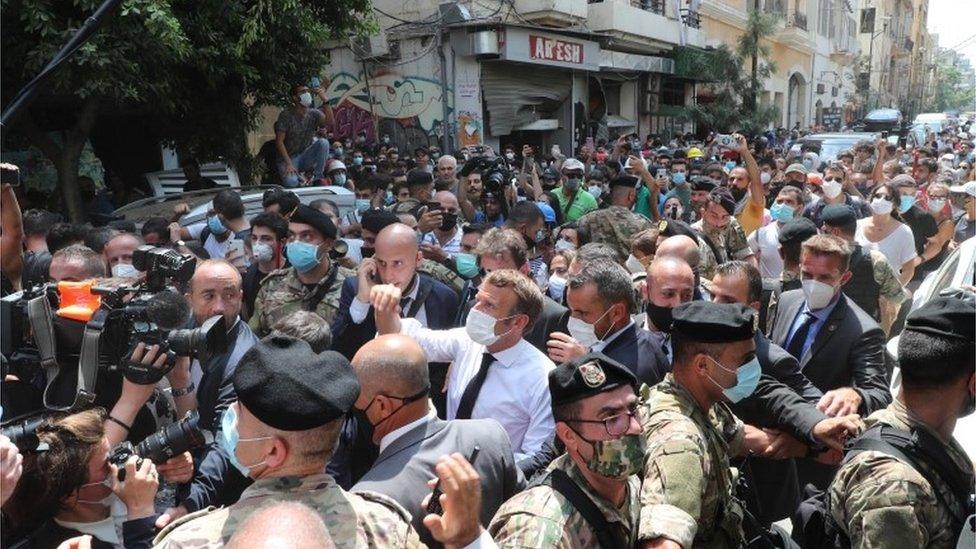
Mr Macron was mobbed in the streets
Earlier in the day the French president was mobbed as he walked around the blast-hit city, with residents imploring him to help and denouncing their leaders.
"Help us, you are our only hope," one resident called out. "Please don't give money to our corrupt government," said another, before adding: "We can't take this any more."
France - the former colonial power in Lebanon - has sent three planes carrying rescuers and medical kit to Lebanon, with a fourth arriving later and a French navy helicopter carrier carrying French investigators and further supplies due to arrive next week.
Aerial footage shows flattened buildings after an explosion in Beirut's port area

A city of sirens, empty buildings and empty streets
By Quentin Sommerville, BBC News, Beirut
This port was Lebanon's lifeline to the whole world. Something like 80% of the country's grain came through here. The grain silos, which were built way back when, are teetering. Just beyond there I can see a ship listing heavily. I've lived in Beirut for five years and it's almost unrecognisable - it's a city of sirens, of empty buildings, of empty streets.
As I look at the neighbourhood of Gemmayze just behind the port, I can't see a single pane of glass left. Entire roofs have gone - I can see friends' apartments which are just open to the sky now. All of this area, which was really heavily populated, has been abandoned. No-one is coming back here any time soon.
What's really noticeable as you walk the streets here is that every second person seems to have a broom in their hand. There are clear-up teams everywhere, but it's pretty low tech: tiny teams of people with pans and brushes to clean up an an entire city's devastation.
The thing that really strikes me is how enormously stupid it was, what criminal negligence it took to leave this highly explosive material right in the very heart of this city, within yards of people, their homes, their businesses. And the authorities here knew - they had been warned that these chemicals were dangerous and that they were a great risk to Beirut and Lebanon.

What triggered the explosion?
The ammonium nitrate - which is used as a fertiliser and as an explosive - had been in a warehouse in the port for six years after it was unloaded from a ship impounded in 2013.
The head of the port and the head of the customs authority said that they had written to the judiciary several times asking that the chemical be exported or sold on to ensure port safety.
Port General Manager Hassan Koraytem told OTV they had been aware that the material was dangerous when a court first ordered it stored in the warehouse, "but not to this degree".
Rami Ruhayem has been to Gemmayze, the closest residential area to the port
The ammonium nitrate arrived on a Moldovan-flagged ship, the Rhosus, which entered Beirut port after suffering technical problems during its voyage from Georgia to Mozambique, according to Shiparrested.com, which deals with shipping-related legal cases.
The Rhosus was inspected, banned from leaving and was shortly afterwards abandoned by its owners, sparking several legal claims. Its cargo was stored in a port warehouse for safety reasons, the report said.

More on the explosion in Beirut
IN PICTURES: Chaos and destruction
AMMONIUM NITRATE: What is it? How dangerous is it?
Q&A: What we know
THE CONTEXT: Why Lebanon is in crisis

What is the latest on rescue efforts?
A French rescue team working in the city said there was still a good chance of finding survivors, two days after the explosion.
One unnamed rescuer told Mr Macron that they hoped to find a group of seven or eight people believed to be trapped in a "control room" under the rubble.
Earlier media reports that a father-of-two, Amin Zahid, had been rescued from the sea on Thursday morning have been thrown into doubt after comments under an Instagram account set up to help families locate missing people suggested that the man pulled from the sea was not him. A new account appealing for information about Mr Zahid has been set up.
Security forces have sealed off a wide area around the blast site.
Public Health Minister Hamad Hassan said Lebanon's health sector was short of beds and lacked the equipment necessary to treat the injured and care for patients in critical condition.
As many as 300,000 people have been left homeless by the blast, said Beirut's governor Marwan Aboud.
He told the BBC: "Beirut needs food, Beirut needs clothes, houses, materials to rebuild houses. Beirut needs a place for the refugees, for its people."
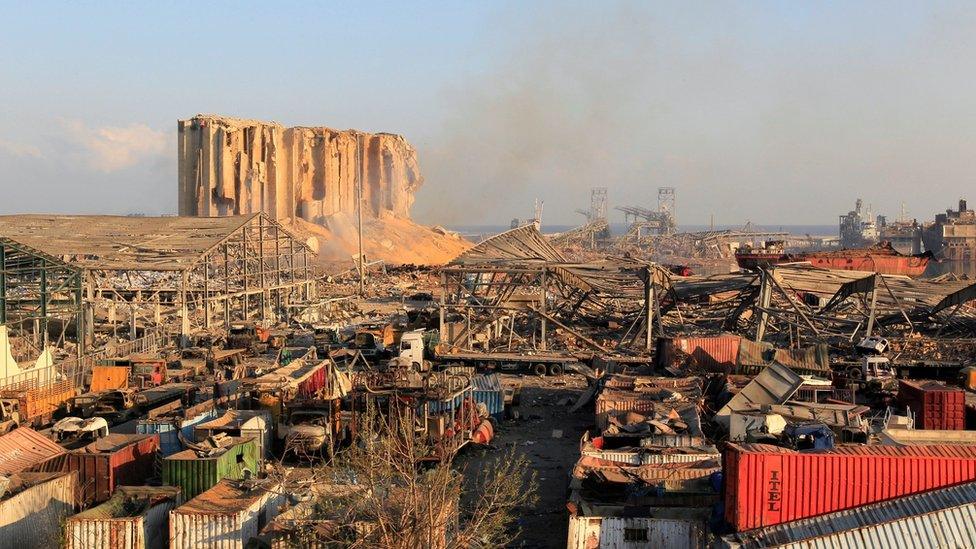
The explosion destroyed the surrounding area
Economy Minister Raoul Nehme meanwhile said the country would have to rely at least partly on foreign aid to rebuild.
"We're not swimming in dollars," he told Sky News Arabia.
What's the background?
The explosion comes at a sensitive time for Lebanon. Covid-19 infections were on the rise and hospitals were already struggling to cope.
The country is also going through the worst economic crisis since the 1975-1990 civil war, and tensions were already high with street demonstrations against the government. People have to deal with daily power cuts, a lack of safe drinking water and limited public healthcare.
Lebanon imports most of its food and large quantities of grain stored in the port have been destroyed causing fears of widespread food insecurity to come. The future of the port itself is in doubt.


Have you been personally affected by this story? If you feel able to do so please share your experiences by emailing haveyoursay@bbc.co.uk, external.
Please include a contact number if you are willing to speak to a BBC journalist.
WhatsApp: +44 7756 165803
Tweet: @BBC_HaveYourSay, external
Send pictures/video to yourpics@bbc.co.uk, external
Please read our terms & conditions and privacy policy
- Published5 August 2020
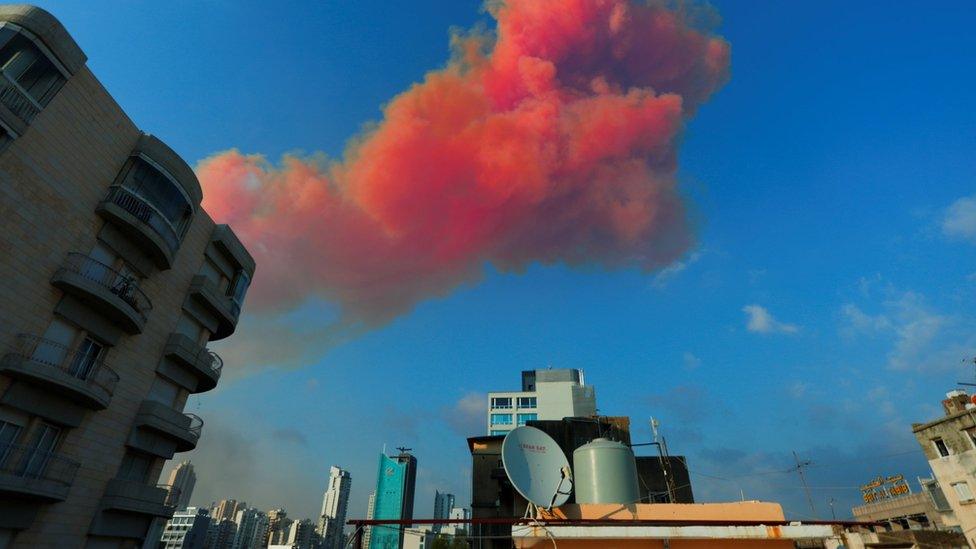
- Published5 August 2020
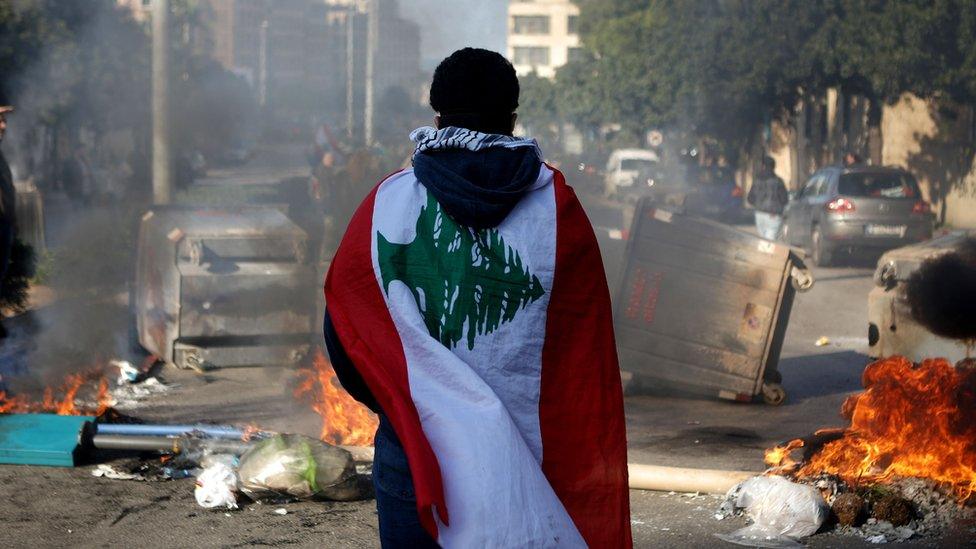
- Published4 August 2020
